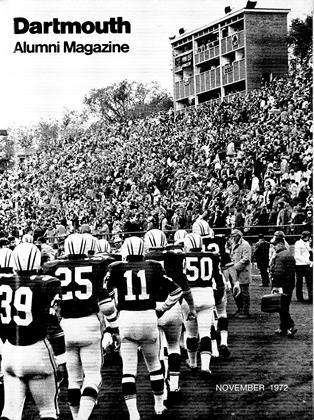NO TIME FOR SCHOOL, NO TIME FOR PLAY: THE STORY OF CHILD LABOR IN AMERICA.
NOVEMBER 1972 JOHN HURD '21NO TIME FOR SCHOOL, NO TIME FOR PLAY: THE STORY OF CHILD LABOR IN AMERICA. JOHN HURD '21 NOVEMBER 1972
By Rhoda and WilliamCahn '34. New York: William Messner,1972. Illustrated with Photographs. 64 pp.$4.50.
One fourth of all farm workers in the United States are younger than 16. In many states children still stoop and crawl through harvest crops in 100-degree heat for ten hours a day. Sometimes they must creep through fields with dangerous chemicals used to kill insects. Among the tens of thousands of children slaving in fields and on farms are some only six years old.
In this brief volume, dramatic with 37 photographs, Rhoda Cahn, a school psychologist specializing in communication techniques for children, and William Cahn, a prolific writer about industrial and labor problems, present evidence to show that problems facing vast number of working children continue to make headlines and that the struggle to abolish child labor throughout the United States is far from successful.
Historically minded, the Cahns include pithy and pitiful stories about how in earlier days the industrial system forced impoverished families to send their offspring not to school but into mines, textile mills, and factories where, though they worked full-time like adults, they were paid pittances. In some garment sweatshops little girls were fined for talking and even for smiling.
As late as 1938 only 28 states had passed a national regulation to end child labor (36 were necessary), and several million children were enslaved in factories and in mines, on fields and on farms. But in that year President Franklin D. Roosevelt signed the bill to end child labor.
But not really "to end." Labor unions, school and religious organizations and concerned citizens are still at loggerheads with employers who resent flabby talk and prevent children from attending school. If children could only learn about honest sweat and be kept from the corrupting influences of permissive teachers, they would enjoy a better chance to grow up to become productive adults, healthy, sensible, and philoprogenitive. Freed from the curses of drugs and drink, they would applaud the Free Enterprise System which has made America the great and peace-loving country it is today, admired and respected by the whole world.
 View Full Issue
View Full Issue
More From This Issue
-
 Feature
FeatureFour Views of Educational Opportunity at Convocation Opening the 203rd Year
November 1972 -
 Feature
Feature1972 ANNUAL REPORT
November 1972 -
 Feature
FeatureElection '72: A Historian's View
November 1972 By JAMES E. WRIGHT -
 Feature
Feature"A Greater Feminine Presence"
November 1972 -
 Article
ArticleBig Green Teams
November 1972 -
 Article
ArticleFaculty
November 1972
JOHN HURD '21
-
 Books
BooksA MATTER OF CHOICE.
DECEMBER 1968 By JOHN HURD '21 -
 Books
BooksPOEMS AND PERSPECTIVES.
NOVEMBER 1971 By JOHN HURD '21 -
 Books
BooksDOUBLE TAKE.
FEBRUARY 1972 By JOHN HURD '21 -
 Books
BooksTHE YOUNG MILLIONAIRES.
October 1973 By JOHN HURD '21 -
 Article
ArticleRed, Cav, Tuss, and The Ferocious Cherub
December 1973 By JOHN HURD '21 -
 Books
BooksALL THE BEST IN MEXICO
December 1974 By JOHN HURD '21
Books
-
 Books
BooksTHE TRUCK SYSTEM.
April 1961 By DAVID ROBERTS -
 Books
BooksEskimo Culture
MARCH 1983 By Elmer Harp Jr. -
 Books
BooksBlack Sheep
March 1977 By HENRY L. TERRIE JR. -
 Books
BooksKEATON.
DECEMBER 1967 By J. BLAIR WATSON -
 Books
BooksPHYSICAL CHEMISTRY FOR STUDENTS OF BIOLOGY AND MEDICINE
June 1933 By John P. Amsden -
 Books
BooksThreading the Maze
June 1980 By Robert H. Ross ’38

